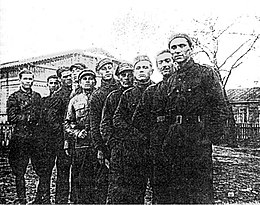Naliboki massacre
Details
| Location | Naliboki, German-occupied Poland |
|---|---|
| Date | May 8, 1943 |
| Weapons | Automatic and semi-automatic weapons |
| Deaths | 129 |
| Victims | Poles |
| Perpetrators | Soviet |
Sources
Naliboki massacre
Introduction
The Naliboki massacre (Polish: zbrodnia w Nalibokach) was the 8 May 1943 mass killing of 129 Poles, including women and children, by Soviet partisans in the small town of Naliboki in German-occupied Poland (the town is now in Belarus).
Background
Before the 1939 German-Soviet invasion of Poland, Naliboki was part of eastern Poland's Stołpce County, Nowogródek Province.
Following Operation Barbarossa, Germany's invasion of the Soviet Union, Soviet resistance forces operated in eastern Poland, behind German lines, in Naliboki forest. In 1942, NKVD leaders were sent in to them by Central Headquarters of the Partisan Movement, and the partisans were airdropped material. Local partisans were recruited from Red Army soldiers of all ethnicities who had been cut off by German encirclements, and from Ukrainians and pro-Soviet Belarusians. They forcibly took provisions from villagers, whom they treated as enemies. The murder of peasants by way of terrorizing them into giving up provisions began in 1943 when villages such as Kamień, Derewno, Borowikowszczyzna, Dziagwie, and Rodziewszczyzna were raided. Naliboki was among the raided villages. Consequently, in August 1942, by order of the Germans, the villagers formed a self-defense unit, and the village police station was closed.
In March and April 1943 the Soviet partisans arranged two meetings with the Polish self-defense leaders. During the talks, the Soviet partisans insisted that the Poles join them, but the Poles refused. However, an agreement was signed with the Poles, who were represented by Eugeniusz Klimowicz, concerning a truce and joint operations against robbers hiding in the forest. The Soviet partisans violated the truce.
According to the Polish Institute of National Remembrance, the attacks on Polish underground units by Soviet partisans could not have been circumvented by Jews in their ranks. The historian Kazimierz Krajewski reported that in the forest around Lida some 25% of the partisans were Jewish, or as many as 1,200 people, even though only 162 of them were armed, because the Soviet handouts were few and far between. Notably, the Soviet NKVD persecuted the pro-German Belarusian populace at least as badly as the anti-Nazi Poles. Thousands of Belarusian collaborators were killed, including teachers, local administrators and members of the Belarusian Auxiliary Police, and dozens of Polish communities were destroyed. Resulting from this, on at least ten occasions the Nowogródek District division (pl) of the Armia Krajowa attempted to negotiate with the Soviet partisans to stop the attacks on hapless villages. Those attempts were futile. In May 1943, the entire Polish delegation was murdered by the Soviets in the powiat of Szczuczyn and the pacifications continued. Apart from Naliboki, other massacres were committed in Koniuchy (Koniuchy massacre), Szczepki, Prowżały, Kamień, Niewoniańce, Izabelin, Kaczewo, Babińsk, and Ługomowicze, including murders around Dokudów and near the Narocz and Kromań lakes, as well as in Derewno.
The massacre
On the night of 8–9 May 1943, Soviet partisans raided Naliboki. A few of the Soviet attackers, including a political officer, were killed by the defenders. Polish men were dragged from their homes and shot individually or in small groups. Mass looting followed. Many farmhouses were set on fire. Also killed during the Soviet attack were three Polish women, several teenagers, and a ten-year-old boy. The town's church was set on fire, along with the public school, fire station, and post office. The raid took two to three hours.
The Soviet commander reported to the NKVD the killing of 250 people, the capture of weapons, the rounding up of 100 cows and 78 horses, and the destruction of a German garrison. In reality, the number of victims was lower (now estimated at 129), no Germans were present or killed, and only one Belarusian auxiliary policeman happened to be sleeping in the town on the night of the attack.
2001 investigation
Following Operation Barbarossa, the Soviet partisans active in the area of eastern Poland were often joined by the Polish Jews trying to survive the escape from the Nazi ghettos. The controversy, as noted in a communique released by the Polish Institute of National Remembrance IPN, concerns the participation of the Bielski partisans who might have supported the Soviets in the attack based on their ongoing relationship.
On 20 March 2001 an investigation into the Naliboki massacre was launched by IPN in Łódź. In May 2003, prosecutor Anna Gałkiewicz from IPN's Commission for the Prosecution of Crimes against the Polish Nation KŚZpNP, in charge of the investigations into the massacres in Naliboki and Koniuchy, reported that surviving eyewitnesses from Naliboki recognized Jews who had previously been in the Bielski partisans participating in the attack.[better source needed] As of April 2009 the IPN has not reported its findings, however historian Bogdan Musiał has stated that there was no evidence to support the allegation that the Bielski partisans were involved in the attack.[better source needed] According to a statement by the IPN, the unit involved was the "Stalin" brigade, accompanied by partisans from the "Dzerzhinsky", "Bolshevik" and "Suvorov" units. As of November 2018, the regional division of IPN stated that investigations regarding war crimes in Nowogródek Voivodeship of the Second Polish Republic were still ongoing.
